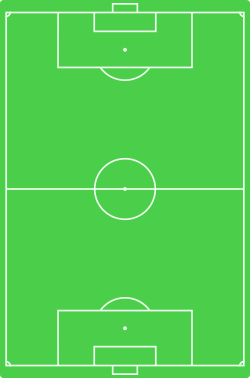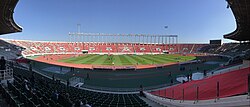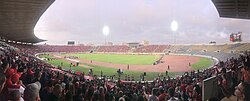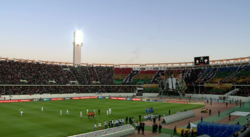Morocco national football team
The Morocco national football team (Arabic: المنتخب المغربي لكرة القدم) represents Morocco in men's international football, and is controlled by the Royal Moroccan Football Federation, the governing body for football in Morocco.
One of Africa's most successful national football teams, Morocco won the 1976 African Cup of Nations, two African Nations Championships, and a FIFA Arab Cup while participating in the FIFA World Cup six times. In 1986, they made history as the first African team to top a World Cup group and advance to the knockout stage, where they lost 1–0 to West Germany. Thirty-six years later, at the 2022 FIFA World Cup, Morocco once again defied expectations, topping a group that included Croatia, Canada and Belgium. They then went on to defeat Spain and Portugal, becoming the first African and first Arab team to reach a World Cup semi-final. They were the third World Cup semi-finalist not from Europe or South America.
Morocco is set to become the second African nation, the second MENA nation, and the first North African nation to host the World Cup when it was chosen as a co-host for the 2030 edition alongside Portugal and Spain.
The Atlas Lions were ranked 10th in the FIFA World Rankings in April 1998. They were ranked as the top African national team for three consecutive years, from 1997 to 1999, and again since December 2022. As of April 2025, Morocco is ranked as the 12th-best national team in the world.
History
Pre-independence period

The Moroccan national team was founded in 1928 and played its first game on 22 December of that year against France's B team, losing 2–1. This team, formed by the best footballers of the LMFA, or the Moroccan Football League (settlers or natives), was active in friendly matches against other North African teams such as Algeria and Tunisia. These associations of settler clubs and local footballers, in addition to having their own championship, clashed with each other in a tournament that Morocco won several times, such as in 1948–1949. The LMFA also faced other club teams such as NK Lokomotiva Zagreb in January 1950, as well as France A and France B.
On 9 September 1954, an earthquake struck the Algerian region of Orléansville (now Chlef), destroying the city and killing 1,400 people. On 7 October 1954, the French Football Association and the Maghreb inhabitants organized a charity match to raise funds for the families of the victims of the earthquake. In the match, held at the Parc de Princes in Paris, a team made up of Moroccans, Algerians and Tunisians played against France. Led by star Larbi Benbarek, the Maghreb selection managed to win 3–2, a month before the Toussaint Rouge attacks by the Algerian National Liberation Front which marked the beginning of the Algerian War.
Beginning of Morocco (1955–1963)

In 1955, the Royal Moroccan Football Federation was established, at the end of the French protectorate of Morocco, which had lasted since 1912.
On 19 October 1957, at the second edition of the Arab Games in Lebanon, Morocco made its debut as an independent country against Iraq, at the Camille Chamoun Sports City Stadium, and drew 3–3. At the tournament, Morocco recorded their first-ever win, defeating Libya 5–1, then beat Tunisia 3–1 to reach the semi-finals. After a 1–1 draw with Syria, lots were drawn to decide who would progress to the final, and Syria were selected at Morocco's expense. Morocco withdrew from the third-place play-off against Lebanon and finished fourth overall.
Between 1957 and 1958, Morocco held numerous friendly matches against the National Liberation Front team, the representative of Algeria before its independence in 1958. In 1959, the team took part for the first time in an international competition, the qualifying rounds of the 1960 Rome Olympics. Drawn into a group with Tunisia and Malta, Morocco finished second on goal difference and failed to progress. That same year, the Royal Moroccan Football Federation joined FIFA.
In 1960, Morocco competed in World Cup qualification for the first time. Drawn against Tunisia in the first round, Morocco won the first leg 2–1, while Tunisia won the second leg by the same score. A play-off held in Palermo, Italy finished in a draw, so a coin toss was used to determine who progressed. Morocco won the toss, and beat Ghana 1–0 on aggregate to reach the inter-continental play-offs. Drawn against Spain, Morocco lost 4–2 on aggregate and thus failed to qualify.
The following year, Morocco held the Pan-Arab Games and won the football tournament, winning all five of their matches. Their third match, against Saudi Arabia, resulted in Morocco's biggest-ever victory, winning 13–1. They also claimed their first two wins against a European team, beating East Germany 2–1 and 2–0.
In 1963, the Moroccan team came close to qualifying for the African Cup of Nations; in the decisive play-off against Tunisia, they were defeated 4–1 in Tunis and won 4–2 at home, therefore being eliminated. At the 1963 Mediterranean Games in Naples, they finished fourth after a 2–1 defeat in the final for third place against Spain's reserve team.
First appearances in international competitions (1963–1976)
Morocco participated in the final phase of an international competition for the first time at the 1964 Tokyo Olympics. Having qualified under the leadership of manager Mohamed Massoun, the Moroccans were included in a group of three teams due to the withdrawal of North Korea. Morocco lost both their matches, against Hungary (6–0, the team's worst-ever defeat) and Yugoslavia (3–1, despite taking the lead in the second minute via Ali Bouachra).
In 1966, the Moroccan Football Association joined the Confederation of African Football, and the team participated in qualifying for the 1970 World Cup in Mexico. Their debut eliminated Senegal (1–0) and Tunisia after a draw. In the final round of the preliminaries, against Sudan and Nigeria, Morocco obtained five points, finishing ahead of Nigeria. Shortly after, Morocco lost the decisive play-off against Algeria to enter the final stage of the 1970 Africa Cup of Nations.
Morocco thus became the first African national team to qualify for the World Cup after having played in an elimination tournament. The Moroccan team, coached by the Yugoslav Blagoje Vidinić, consisted entirely of players in the Moroccan league, including Driss Bamous and Ahmed Faras.
On 3 June 1970, against West Germany, Morocco opened the scoring with a goal in the 21st minute of the game scored by Houmane Jarir. In the second half, however, the Germans scored twice and won 2–1. The Atlas Lions then played against Peru, conceding three goals in ten minutes to lose 3–0. On 11 June 1970, the eliminated Moroccans drew with Bulgaria 1–1. It was the first point obtained by an African national team at the World Cup.
In 1972 Africa Cup of Nations qualification, the Atlas Lions ousted Algeria, then faced Egypt, defeating them 3–0 in the first leg and suffering a 3–2 defeat on the way back. However, the aggregate win meant they qualified for the final phase of the continental tournament for the first time. In the group stage, they accumulated three 1–1 draws against Congo, Sudan and Zaire and were eliminated in the first round. All three Moroccan goals were scored by Ahmed Faras.
Qualifying for the 1972 Olympics in Munich with two wins and two draws, Morocco debuted in Group A with a goalless draw against the United States, then lost 3–0 against hosts West Germany and defeated Malaysia 6–0 with a Faras hat-trick, thereby advancing to the second round. Due to defeats against USSR (3–0), Denmark (3–1) and Poland (5–0), they were eliminated from the tournament; finishing bottom of their group.
In the 1974 World Cup qualifiers, Morocco successfully passed three qualifying rounds before entering the final stage alongside Zambia and Zaire. Losing 4–0 away against Zambia, the Moroccans bounced back in the second game, defeating the same opponent 2–0 at home. They then went to Zaire for their third game but lost 3–0, conceding all three goals in the second half, with Faras leaving the field due to injury. Morocco filed an appeal, trying to get the match to be replayed; it was dismissed by FIFA. In protest, Morocco withdrew from the qualifiers causing the Atlas Lions to miss their final game at home against Zaire which had already qualified for the finals, with FIFA awarding Zaire a 2–0 win on walkover. For the same reason, Morocco also decided not to take part in the 1974 African Cup of Nations qualification. As a result, in 1974, Morocco played only two games, both against Algeria, achieving a 2–0 win and a 0–0 draw. Morocco then resumed playing in FIFA and CAF competitions, qualifying for the 1976 Africa Cup of Nations by eliminating Ghana in the last round, but failed to qualify for the 1976 Olympics, being eliminated by Nigeria.
Between successes and defeats (1976–1986)
Morocco, coached by the Romanian Virgil Mărdărescu and captained by Faras, took the continental throne at 1976 African Cup of Nations, in only the country's second participation in the competition. Ahmed Makrouh scored in the final to equalize at 1–1, which gave Morocco the first, and to date, only cup in its history.
After failing to qualify for the 1974 FIFA World Cup, they also missed the 1978 and 1982 tournaments. At the 1978 Africa Cup of Nations, they were eliminated in the first round, while in 1980 they finished in third place, beating Egypt 2–0. They then won the 1983 Mediterranean Games, played at home, after a 3–0 win in the final against Turkey B.
Morocco did not qualify for either the 1982 or 1984 Africa Cup of Nations. Two years later, they finished fourth, losing 3–2 in the third-place play-off to Ivory Coast.
Difficult Years (1986–2000)
Morocco qualified for the 1986 FIFA World Cup in Mexico, and topped a group consisting Portugal, England and Poland, thanks to two draws against the English and Polish and a 3–1 win against the Portuguese. However, they were narrowly eliminated by West Germany in the first knockout round, thanks to a goal from Lothar Matthäus one minute from the end of regulation time. Morocco became the first African and Arab national team to advance from the first round of the World Cup.
Two years later, the Moroccan team presented itself at the 1988 African Cup of Nations as a host country with high expectations. After winning in the first round, they were eliminated in the semifinals by Cameroon and finished in fourth place after losing the third-place play-off against Algeria 1–1 after extra time, 4–3 after penalties.
Failure to qualify for the 1990 FIFA World Cup opened a period of crisis. In the 1992 African Cup of Nations, the team was eliminated in the first round. They then did not participate in the 1994 or 1996 African Cup tournaments. They, however, did qualify for the 1994 World Cup in the United States and the 1998 tournament in France.
At the 1998 Africa Cup of Nations, after winning their group, Morocco were defeated by South Africa 2–1.
Golden Generation (2006–present)

Morocco took part in the 2004 African Cup of Nations, drawn into Group D defeating Nigeria 1–0, defeating Benin 4–0 and drawing 1–1 with South Africa. Morocco qualified to the knockout stages, facing Algeria; they eventually won 3–1 in extra time, and 4–0 against Mali in the semi-final. They lost the 2004 African Cup of Nations Final against Tunisia 2–1.
In 2012, the national team won the Arab Cup, topping their group, defeating Iraq in the semi-final and Libya in the final.
In 2014, Morocco debuted in the African Nations Championship after failing to qualify in the 2009 and 2011 editions. Led by coach Hassan Benabicha, Morocco were eliminated in the second round after losing 4–3 to Nigeria in the quarter-finals. They managed to qualify for the 2016 African Nations Championship, but were eliminated in the group stages. Morocco hosted the 2018 African Nations Championship, which included a victory for the home nation, the third North African country to win the competition's title.

Morocco returned to the World Cup after a 20-year absence in 2018. The North Africans were drawn in Group B with World Cup favourites Spain, Portugal, and Iran. In their opening game against Iran, Morocco showed full dedication but lost 1–0 in the final minutes of the match, scored by an own goal. In their second game, Morocco faced Portugal but ended losing 1–0 by a goal scored by Cristiano Ronaldo. In the last match against Spain they took a 2–1 lead, with goals scored by Khalid Boutaïb and Youssef En-Nesyri, but the match eventually ended 2–2.
Morocco entered the 2019 AFCON with high confidence and players claiming them to be the favourite to win. However, in spite of three straight group stage wins, Morocco were shockingly knocked out by Benin in the round of sixteen.
At the 2020 African Nations Championship in Cameroon, Morocco won their second CHAN title, in its second consecutive final appearance. Captained by Ayoub El Kaabi, they defeated Togo (1–0), Rwanda (0–0), the Uganda (5–2), Zambia (3–1), and Cameroon (4–0) on the way to a final against Mali in Yaoundé. Morocco won 2–0, with both goals scored late into the second half by Soufiane Bouftini and Ayoub El Kaabi. Morocco thus became the first team to win back-to-back titles. Soufiane Rahimi went on to be named Total Man of the tournament after an astonishing performance scoring a total of 5 goals.
In December 2021, Morocco started its venture at the 2021 FIFA Arab Cup's Group C, along with Jordan, Palestine and Saudi Arabia. Morocco opened the tournament with a 4–0 win against Palestine, and then managed to overcome a highly defensive Jordan with another 4–0 triumph, before winning their final match in a 1–0 victory against Saudi Arabia. They were eliminated in the quarter-finals after a penalty-shootout against Algeria.
After easily topping their 2021 Africa Cup of Nations qualification group which consisted of Mauritania, Burundi, and Central African Republic, Morocco entered the tournament in Cameroon. Morocco were drawn into group E alongside Gabon, Ghana and Comoros, and won their first game against Ghana scored by Sofiane Boufal in the final minutes of the game. In their second game against Comoros, they claimed a 2–0 victory. Their final match against Gabon ended in a draw, making Morocco reach the round of 16 after ending up first in the group. They defeated Malawi 2–1 in the round of 16, before being eliminated in the quarter-finals after a 2–1 loss against Egypt.
After qualifying for the 2022 FIFA World Cup by winning the third round of CAF qualifiers, the team was drawn in Group F along with Croatia, Belgium, and Canada. After holding previous runners-up Croatia to a 0–0 draw and defeating Belgium 2–0, a 2–1 win over Canada meant they finished top of the group and advanced to the round of 16 for the first time since 1986. In the round of 16, they met Spain, drawing 0–0. In the subsequent penalty shootout, goalkeeper Yassine Bounou saved two penalties, and Achraf Hakimi scored the decisive penalty with a panenka penalty for Morocco to advance to the quarter-finals for the first time. They advanced further to the semi-finals winning against favourite Portugal, 1–0, with a powerful header by Youssef En-Nesyri. Morocco therefore became the first African and Arab team to qualify for the semi-finals.
However, they lost to France in the semi-final, 2–0 on 14 December at the Al Bayt Stadium in Al Khor, putting an end to Morocco's World Cup run. They played Croatia in the third place play-off on 17 December at the Khalifa International Stadium in Al-Rayyan, a rematch of the earlier group stage meeting. They lost 2–1 to the latter, and ended their World Cup campaign at fourth place. The team would go on to donate their entire World Cup earnings from the tournament to charities within Morocco that help with poverty that affects children and families in the country.
Home stadium
From 2011, the Atlas Lions played most of their matches in the new Marrakesh Stadium, which has a capacity of 45,240 seats. The stadium is considered to bring luck to the Moroccan team; they won several matches there in front of a large audience, including a 4–0 victory against Algeria in qualification for the 2012 Africa Cup of Nations.
During Ezzaki Badou's tenure as coach from 2014 to 2016, Morocco played most of its matches at the Adrar stadium in Agadir, which has a capacity of 45,480. A friendly was played there during Hervé Renard's tenure between Morocco and the Netherlands in 2017.
Morocco also has other large stadiums built in the 2000s such as the Fez Stadium which has 45,000 seats and which hosts the two clubs of the city: MAS Fez and Wydad de Fès.
- Prince Moulay Abdellah Stadium, Rabat
- Stade Mohamed V, Casablanca
- Stade de Marrakech, Marrakech
- Stade Ibn Batouta, Tangier
- Adrar Stadium, Agadir
Kit suppliers
Morocco's home colours are most red shirts and green shorts and socks. Away colours are usually all white or all green.
Results and fixtures
The following is a list of match results in the last 12 months, as well as any future matches that have been scheduled.
Win Draw Loss Fixture2024
| 22 March Friendly | Morocco | 1–0 | Agadir, Morocco | |
| 19:00 UTC+0 | Report | 15 | Stadium: Adrar Stadium Referee: Boubou Traoré (Mali) |
| 26 March Friendly | Morocco | 0–0 | Agadir, Morocco | |
| 19:00 UTC+0 | Report | Stadium: Adrar Stadium Referee: Mohamed Moussa (Niger) |
| 7 June 2026 World Cup qualification | Morocco | 2–1 | Agadir, Morocco | |
| 20:00 UTC+1 |
| Report |
| Stadium: Adrar Stadium Referee: Issa Sy (Senegal) |
| 11 June 2026 World Cup qualification | Congo | 0–6 | Agadir, Morocco | |
| 17:00 UTC+1 | Report | Stadium: Stade des Martyrs Attendance: 30,000 Referee: Daniel Nii Laryea (Ghana) |
| 6 September 2025 AFCON Q | Morocco | 4–1 | Agadir, Morocco | |
| 20:00 UTC+1 | Report |
| Stadium: Adrar Stadium Referee: Dahane Beida (Mauritania) |
| 9 September 2025 AFCON Q | Lesotho | 0–1 | Agadir, Morocco | |
| 19:00 UTC+1 | Report |
| Stadium: Adrar Stadium Referee: Clement Franklin Kpan (Ivory Coast) |
| 12 October 2025 AFCON Q | Morocco | 5–0 | Oujda, Morocco | |
| 20:00 UTC+1 |
| Report | Stadium: Honor Stadium Referee: Alhasan Baboucarr Bass (Gambia) |
| 15 October 2025 AFCON Q | Central African Republic | 0–4 | Oujda, Morocco | |
| 20:00 UTC+1 | Report |
| Stadium: Honor Stadium Referee: Naby Laye Toure (Guinea) |
| 15 November 2025 AFCON Q | Gabon | 1–5 | Franceville, Gabon | |
| 20:00 UTC+1 |
| Report | Stadium: Stade de Franceville Referee: Abongile Tom (South Africa) |
| 18 November 2025 AFCON Q | Morocco | 7–0 | Oujda, Morocco | |
| 20:00 UTC+1 | Report | Stadium: Honor Stadium Referee: Jean-Jacques Ndala (DR Congo) |
2025
| 21 March 2026 World Cup qualification | Niger | 1–2 | Oujda, Morocco | |
| 21:30 UTC+0 |
| Report |
| Stadium: Honor Stadium Attendance: 20,000 Referee: Omar Artan (Somalia) |
| 25 March 2026 World Cup qualification | Morocco | 2–0 | Oujda, Morocco | |
| 21:30 UTC+0 | Report | Stadium: Honor Stadium Referee: Alhadi Allaou Mahamat (Chad) |
| 7 June Friendly | Morocco | v | Rabat, Morocco | |
| --:-- UTC+1 | Report | Stadium: Prince Moulay Abdellah Stadium |
| September 2026 World Cup qualification | Morocco | v | Morocco |
| September 2026 World Cup qualification | Zambia | v | Zambia |
| October 2026 World Cup qualification | Congo | Cancelled |
| 21 December 2025 AFCON Group A | Morocco | – | Rabat, Morocco | |
| 20:00 UTC+1 | Stadium: Prince Moulay Abdellah Stadium |
| 26 December 2025 AFCON Group A | Morocco | – | Rabat, Morocco | |
| 13:00 UTC+1 | Stadium: Prince Moulay Abdellah Stadium |
| 29 December 2025 AFCON Group A | Morocco | – | Rabat, Morocco | |
| 18:30 UTC+1 | Stadium: Prince Moulay Abdellah Stadium |
Coaching staff

Coaching history
- As of 30 January 2023
Players
Current squad
The following players were called up for 2026 FIFA World Cup qualification matches against Niger and Tanzania, on 21 and 25 March 2025 respectively.
Caps and goals are correct as of 25 March 2024, after the match against ![]() Tanzania.
Tanzania.
Recent call-ups
The following players have also been called up for the team in the last twelve months.
Previous squads
Player records
- As of 25 March 2025
- Statistics include official FIFA-recognised matches only.
- Players in bold are still active with Morocco.
Most appearances
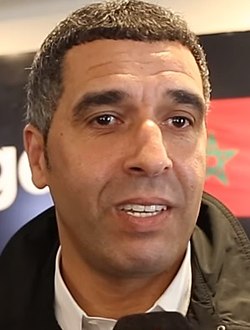
Top goalscorers
Competitive record
FIFA World Cup
Morocco's national football team has participated in the World Cup six times. Their best performance was in the 2022 tournament where they finished in fourth place, becoming the first African and Arab nation to reach the semi-finals of the tournament.
Africa Cup of Nations
African Nations Championship
Olympic Games
- Football at the Summer Olympics has been an under-23 tournament since the 1992 edition.
African Games
- Prior to the Cairo 1991 campaign, the Football at the All-Africa Games was open to full senior national teams.
Mediterranean Games
1951 to 1987 senior teams, from 1991 youth teams.
Arab Games
FIFA Arab Cup
Minor tournaments
Head-to-head performance
Correct as of 25 March 2025 after the match against ![]() Tanzania.
Tanzania.
Honours
ContinentalRegional
| Friendly
Awards
Orders and decorations
Summary |
See also
- Cultural significance of the Atlas lion
- Morocco A' national football team
- Morocco national under-23 football team
- Morocco national under-20 football team
- Morocco national under-17 football team
- Morocco women's national football team
- List of Morocco football players in foreign leagues
- Morocco national football team records and statistics
Other football codes
Notes
References
External links
- Official website of Morocco's FA (in Arabic)
- Morocco FIFA profile
- Morocco CAF profile
- RSSSF archive of results
